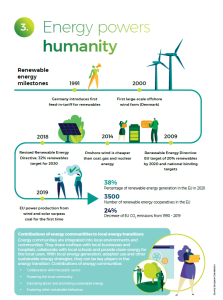3
Agatino Nicita and Monica Musolino
Energy is essential for a normal and functional life in modern society. An energy-powered reality is the only reality we are familiar with. All energy-powered machines and appliances help us function in modern society as well as provide us with comfort and convenience in our day-to-day lives.
Energy is everywhere
We use energy to store and prepare food, as well as to heat and cool our homes. Our education, our economy and our health systems are fully reliable on energy, as well as our transportation system and all our industry. Most of our entertainment is directly or indirectly connected to energy use, everything from cinemas and concerts to smaller activities, such as playing videogames or simply watching TV. Even our most used devices, our smartphones, where we listen to music, talk to our loved ones, surf the internet, take pictures, to name only a few, are energy-dependent. With the development of technology and electrification, the demand for energy in our society will only grow, with many more analogue items being transformed into digital alternatives.
Let’s talk about sustainable energy production and consumption
Nevertheless, access to cheap and reliable energy has had negative effects, too. The intense production of energy from fossil fuels has heavily impacted both society and even more noticeably, the environment, ever since the industrial revolution in the 1800s. In the past few decades, with the rise of global mean temperatures due to climate change, debates and concerns over energy production and its impact have grown. In response, the world has started to move away from emission-intensive energy sources to environmentally friendly, low-carbon options.
The social environment, as well as the access to and development of technology, can affect the way we produce and use energy. Technological or social change can reduce the amount of energy used by society, without affecting the quality and comfort of our current way of life. In fact, responsible energy use can often even improve the quality of one’s life, through reduced environmental risks, supporting healthier and more responsible lifestyle choices, increased economic and national security, and monetary savings.
The role of energy communities in the energy transition
Energy transition is the transformation of the energy system from a heavily fossil-based one to a low-carbon one. While it will require technological solutions at all scales, citizens will also play a big role. One reason for this is that systems based mainly on distributed renewable sources of generation (e.g. solar photovoltaics, wind, biomass) enable consumers to become prosumers, i.e. they can generate their own electricity, to use at home or to feed back into the grid. With further technological advances in energy storage systems (e.g. batteries, hydrogen) and energy management (e.g. demand response, blockchain), citizens will be able to access energy even in off-grid conditions. Energy communities provide a way for everyone to actively participate in developing a clean and sustainable energy system. They can provide low-carbon energy supply, new sustainable jobs, other sustainable benefits, such as community heating and car sharing, encouraging investments in clean energy, supporting local economies and raising awareness about energy issues and solutions. The growing number of community energy projects means energy systems, as well as the social norms and expectations, need to adapt to the new phenomenon. In countries such as The Netherlands, Denmark and Sweden, energy communities already exist in large numbers and are therefore a more established concept already. Elsewhere, particularly in Eastern and Southern Europe, the concept of ‘energy communities’ is still in early stages of development. With more and more countries developing regulations and policies supporting community energy projects, it is expected that the numbers of energy communities will grow in the future.

